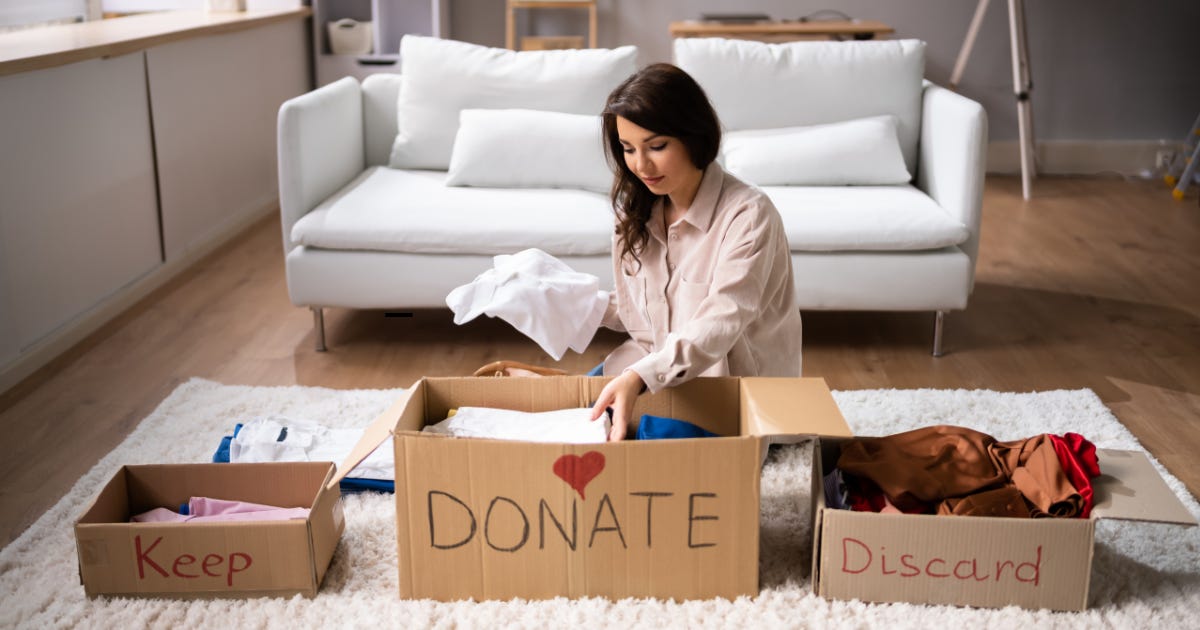In the quest for a tidy and functional home, many people jump straight to organizing without taking the crucial first step: decluttering. While organizing is an essential part of maintaining a neat space, decluttering lays the foundation for effective organization. Here's why you need to declutter before you organize, along with tips and insights to help you on your journey to a more organized life. Scroll to the bottom for a bonus list of 100 things you can declutter now.
1. Decluttering Simplifies the Organization Process
Less to Organize:
When you declutter, you reduce the number of items you need to organize. This simplification makes the organization process faster and easier.
Clarity and Focus:
Decluttering helps you see what you truly need and use. With fewer items, you can focus on organizing only what matters, rather than wasting time on unnecessary belongings.
Example: Imagine trying to organize a cluttered closet full of clothes you never wear. By decluttering first, you eliminate the excess, making it easier to organize and find the clothes you love and wear regularly.
2. Creates Space for Effective Organization
Maximized Storage:
Decluttering creates more space in your storage areas, allowing you to organize your remaining items more effectively.
Improved Accessibility:
With fewer items, you can arrange your belongings in a way that makes them more accessible and easier to find.
Example: A decluttered kitchen pantry with only the essentials is easier to organize, ensuring that everything has its place and is within easy reach.
3. Reduces Stress and Overwhelm
Eases Decision-Making:
Decluttering reduces the number of decisions you need to make about what to keep and where to store it, lowering your stress levels.
Creates a Sense of Accomplishment:
Decluttering provides a sense of accomplishment and progress, motivating you to continue with the organization process.
Example: Tackling a cluttered room can be overwhelming. By decluttering first, you break the task into manageable steps, reducing stress and making the overall process more enjoyable.
4. Promotes Mindful Consumption
Awareness of Possessions:
Decluttering helps you become more aware of what you own, preventing you from buying duplicate or unnecessary items in the future.
Encourages Intentionality:
By letting go of items you no longer need, you cultivate a mindset of intentionality, making you more mindful of future purchases.
Example: After decluttering your living room, you may realize you have more than enough decorative items, curbing the impulse to buy more and encouraging you to cherish what you already have.
5. Enhances Cleaning and Maintenance
Easier to Clean:
A decluttered space is easier to clean and maintain, as there are fewer items to move and dust around.
Reduces Clutter Build-Up:
Decluttering regularly prevents clutter from building up, making it easier to maintain an organized home.
Example: A decluttered bathroom with minimal items on the counter is easier to clean, saving you time and effort in your daily routine.
Tips for Effective Decluttering
Start Small:
Begin with a small area or category, such as a drawer or a shelf, to build momentum.
Use the Four-Box Method:
Label four boxes as "Keep," "Donate," "Sell," and "Trash." Sort items accordingly to streamline the decluttering process.
Set Time Limits:
Set a timer for 15-30 minutes to declutter, preventing burnout and making the task more manageable.
Ask Critical Questions:
Ask yourself if you’ve used the item in the past year, if it adds value to your life, or if it holds sentimental significance. This helps in making informed decisions about what to keep.
Stay Consistent:
Schedule regular decluttering sessions to maintain a clutter-free home and prevent buildup.
Conclusion
Decluttering before organizing is a vital step in creating a functional, stress-free, and enjoyable living space. By reducing the number of items you need to organize, you simplify the process, create more space, and promote a mindset of mindful consumption. Follow these tips to embark on your decluttering journey and pave the way for effective and lasting organization.
Bonus: 100 things you can declutter now! Start with one category at a time to make the process more manageable. Happy decluttering!
Kitchen
Expired food
Duplicate utensils
Old spices
Unused small appliances
Excess pots and pans
Mismatched Tupperware
Old dish towels
Rarely used cookbooks
Extra coffee mugs
Duplicate dishes
Condiment packets
Unused baking supplies
Plastic bags
Broken or chipped dishes
Excess serving dishes
Takeout menus
Magnets and papers on the fridge
Unused water bottles
Old cutting boards
Old grocery bags
Living Room
Old magazines
Excess pillows
Outdated decor
Unused electronics
Excess cables and cords
Duplicate remote controls
Old DVDs and CDs
Books you won’t read again
Worn-out blankets
Toys and games not used
Bedroom
Clothes that don’t fit
Outdated fashion items
Shoes you never wear
Old handbags
Worn-out socks and underwear
Excess jewelry
Unused accessories
Extra bedding
Unused hats and scarves
Excess hangers
Bathroom
Expired medications
Old makeup
Unused toiletries
Duplicate hair products
Old towels
Excess hair tools
Expired skincare products
Hotel toiletries
Old toothbrushes
Empty product bottles
Home Office
Old paperwork
Broken pens and markers
Outdated technology
Unused office supplies
Excess stationery
Old business cards
Receipts you don’t need
Extra notepads
Old magazines or journals
Unused planners
Closet
Clothes you haven’t worn in a year
Shoes you never wear
Belts you don’t use
Unworn accessories
Old or broken hangers
Outdated fashion items
Clothes with tags still on
Seasonal items not used in years
Duplicate clothing items
Worn-out socks
Kids’ Room
Broken toys
Outgrown clothes
Duplicate toys
Unused craft supplies
Old school projects
Extra stuffed animals
Outgrown books
Unused games
Broken electronics
Extra blankets
Garage and Storage
Broken tools
Unused sports equipment
Old paint cans
Duplicates of tools
Seasonal decor not used
Old gardening supplies
Unused car accessories
Old furniture
Broken holiday decorations
Excess storage bins
Miscellaneous
Old cell phones
Outdated manuals
Unused gifts
Broken items you meant to fix
Unused gift wrap and cards
Extra keys
Outdated or unused craft supplies
Old pet supplies
Unused candles
Empty boxes


